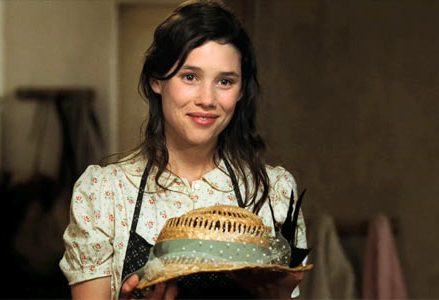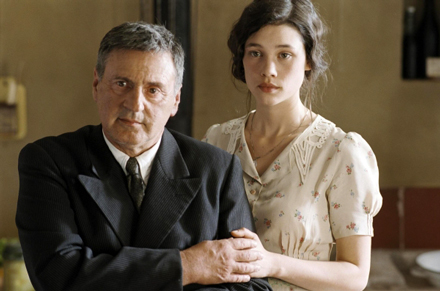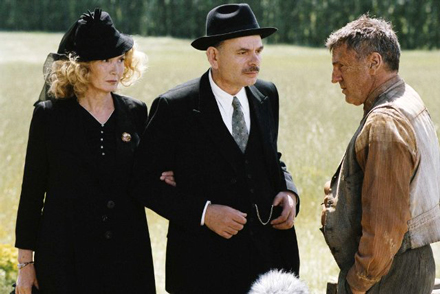
 |
|
|
|
Few Americans are familiar with the movies of French playwright and filmmaker Marcel Pagnol. His work has a universal appeal, as compared to the wonderful comedies of his colleague Sacha Guitry, which depend more on clever manipulations of the French language. Pagnol's satirical comedy Topaze was filmed in simultaneous French and American versions in 1933. His famed trilogy of Marius (1931), Fanny (1932), and César (1936) is an epic romantic drama that made an actor known as Raimu (Jules Auguste Muraire) into an internationally respected star. Unfortunately, the American remake of Fanny (1961) was flattened into a sentimental vehicle for Maurice Chevalier. Raimu played another leading role for Marcel Pagnol. 1940's The Well-Digger's Daughter (La fille du puisatier) is a beautiful story of love and family honor in the rural South of France, co-starring Fernandel and Josette Day, who would later play La Belle in Jean Cocteau's Beauty and the Beast. But just last year a remarkably good remake appeared, written by and starring Daniel Auteuil, who also directed for the first time. The gently paced tale captures Pagnol's love of sun-kissed fields and shady streams, and the impeccable performances bring out conflicting qualities of pride and humility among country people. Unlike Pagnol's other tales of rural conflict -- namely the tragic Jean de Florette and Manon of the Spring -- the people in 2011's The Well-Digger's Daughter are able to resolve their differences with honor and dignity. 
Inexperienced country girl Patricia Amoretti (Astrid Bergès-Frisbey) has manners and poise gained from a childhood spent partly in Paris. She's the oldest of six girls born to well-digger Pascal Amoretti (Daniel Auteuil), a poor widower who loves his brood but by necessity has become resigned to making hard decisions. Grateful that Patricia is taking care of the family so well, Pascal tells his employee Félipe Rambert (Kad Merad) to be cautious in courting her. A match seems unlikely, as Patricia has the bearing of a princess and Félipe knows he's little more than a bumpkin. Patricia is instead swept off her feet by military aviator Jacques Mazel (Nicolas Duvauchelle), the cherished son of the well-to-do local storekeeper Monsieur Mazel and his selfish wife (Jean-Pierre Darroussin & Sabine Azéma). Patricia resists Jacques' direct advances but fate brings them together once too often. She turns up pregnant just as war is declared. Félipe leaves for the infantry thinking he still has a chance, and Jacques is called away so quickly that he must entrust his mother to deliver a note to Patricia. The jealous Mme Mazel instead burns it. Patricia brings the news to her father, who vows to share in her troubles. He takes all of his girls to the Mazel home and respectfully places the facts before the parents of the boy who impregnated his daughter. Pascal knows very well that in his tiny community, a scandal over Patricia's misfortune will taint all the Amorettis. He's forced into a cruel decision. The Well-Digger's Daughter is one of the oldest stories on the shelf. As experienced through these delightful characters it seems entirely fresh. Pascal adores his daughter and wants the best for her, even though he has little to give her. Patricia is indeed a modern princess. She looks Jacques straight in the face when he makes fun of her boot-like sensible farm shoes -- and he's immediately impressed by her Paris accent. When they get together it's the same cruel story that compromises virtuous young women everywhere, in every culture. Patricia resists but the temptation is too strong -- the third time they cross paths her drunken 'safe date' literally puts her on Jacques' motorcycle. When Patricia brings the truth of what has happened to her father, she's obviously blameless by any but the most draconian measure. The worst Pascal has to offer is, "This wouldn't have happened if your mother were here." As could be expected, the Mazels refuse to recognize their son's complicity. Mme Mazel rejects Patricia with insults, which Pascal declines to acknowledge. M. Mazel simply says that "Fathers don't understand their own daughters," a more gentle way to imply that Patricia may be lying. Accustomed as we are to modern entertainment, at this point we expect the beginning of a blood feud, with Pascal defending his honor with a gun. But Pagnol has a much more interesting story to tell. Pascal's speech to the Mazels is a respectful call for understanding and decency. We're amazed that the man is able to remain so self-possessed and levelheaded when speaking up for Patricia's honor. The scene grabs us. Pascal doesn't pretend that he's anything more than a poor well-digger, but his carefully chosen words are delivered in such a way as to entreat the Mazels to hear him out, and to show that he means very serious business. It's a powerful speech and a masterful scene. 
The shock comes when we discover that Pascal's effort is not just Patricia, but for the honor of his family name and the protection of all his girls. When they're alone he gives Patricia the bad news: her place in his house is insupportable. She must go away. For a spell Pascal seems an unreasonable and spiteful father. He insists that Patricia no longer exists. But Pagnol moves on to the only thing that can break Pascal's emotional/pragmatic deadlock: the sight of his grandchild in its crib. Pascal anticipates more trouble: the Mazels suddenly decide after all that the boy may be their grandson. Perhaps it would be better off in their care. Although some really wrenching things transpire in The Well-Digger's Daughter the movie is not a tragedy. The ending is actually a feel-good delight. Pagnol's sympathetic understanding shows that things can work out provided emotions don't get out of control. This is after Mme. Mazel's nasty bit of selfish cruelty, burning Jacques' letter to Patricia. Pascal respects Mme. Mazel -- and all of his characters, actually. In any other story Félipe would be a buffoon, perhaps a contemptible one. But everybody understands Félipe and likes him; Patricia is very fond of him. Pagnol is generous to both Félipe and his audience -- he reserves happy endings for them both. That doesn't mean that there's anything soft about The Well-Digger's Daughter. Screenwriter-director Auteuil doesn't accept Jacques and Patricia as a de facto Prince and Princess. Jacques seems a shallow guy in his seduction of Patricia. When he disappears to serve in the war, Patricia is convinced that he is going to dump her. We never see the contents of his note, which may very well have been a "dear Patricia" letter. When Jacques comes back he expresses his affection in words, not embraces. We don't know -- Jacques may be a very decent guy, but they're still taking a chance. He's a Frenchman with an eye for the ladies, remember. The heartwarming finale of The Well-Digger's Daughter is cued not by big emotions but through the mending of the broken rituals of courtship between families. This time it is M. Mazel's turn to "show some class" and call on Pascal Amoretti with a sincere proposal. The sense of satisfaction in this is extremely touching: for a moment, at least, all is in perfect harmony. 1 
Everybody understands the unspoken rules of the rituals. Félipe has a proposal of his own, but the way he decides to tell Pascal about it acknowledges their comradeship as men that dig together for a living: "Not now, tomorrow when we're in the earth and I have red clay on my hands." Kino Lorber's Blu-ray of The Well-Digger's Daughter is a quality encoding of Daniel Auteuil's very beautiful film. When the storyline skips forward across breaks in time, Auteuil bridges the gap with a three or four shot montage of views of natural scenery, almost as in a film by the Japanese director Ozu. More than pretty pictures, the scenery sets the pace and defines the limits of Patricia's world. She must walk miles to deliver her father's lunch to his work site, and a troublesome creek is in the way. How convenient it is for a handsome -- and brazen -- young man to be present, to offer to carry her across? The sparkling 5.1 sound track makes good use of Alexandre Desplat's score, which incorporates an Italian standard or two. The family name Amoretti suggests that Pascal has an Italian background, which perhaps motivates the choice of songs. One appears to be a ballad that I recognize from the soundtrack to Billy Wilder's Avanti. The film is in French with English subtitles. The subs are burned into the image and are not removable. French language instructors beware. Daniel Auteuil is presently on a directing-writing-acting roll, retracing the steps of Marcel Pagnol. He's remaking the entire Pagnol "Fanny" trilogy, and is again taking the leading part originally played by the legendary Raimu. After The Well-Digger's Daughter, I'll be looking out for Marius.
On a scale of Excellent, Good, Fair, and Poor,
The Well-Digger's Daughter Blu-ray rates:
Footnote:
1. It's good that the specific time frame isn't a crucial issue. The cars and clothing indicate that the story has been updated to the beginning of WW2, yet the swift return of both fighting men to an unchanged rural environment would not appear to jibe with historical reality -- the fast defeat by the Germans, the occupation, etc.. The story is so strong that we overlook this issue completely.
Reviews on the Savant main site have additional credits information and are often updated and annotated with reader input and graphics. Also, don't forget the 2011 Savant Wish List. T'was Ever Thus.
Review Staff | About DVD Talk | Newsletter Subscribe | Join DVD Talk Forum |
| ||||||||||||||||||